
The management of the press is to ensure that newspapers are truly newspapers, that magazines are truly magazines, and news websites are truly news websites, i.e., that press agencies operate in accordance with registered guidelines and purposes.
In September 2020, the Ministry of Information and Communications’ (MIC) inspectorate issued a decision to impose an administrative fine on two magazines – Tap chi moi truong do thi Viet Nam (Vietnam Urban Environment) and Tap chi dien tu Moi truong va Do thi Viet Nam (Vietnam Environment and Urban Area online magazine) as magazines that did not strictly follow principles and purposes shown in their operation licenses. The total fine was VND48 million.
In October 2021, Tap chi Tri Thuc Xanh (Green Knowledge magazine) was fined VND100 million and deprived of the right to use the operation license for print products for four months.
Two of the four administrative violations the press agency committed were that it did not strictly follow operations registered in its license; and that it did not follow the principle and purposes shown in the license, thus causing serious consequences.
In February 2022, the Hanoi Department of Information and Communications’ inspectorate imposed a fine of VND100 million on Tap chi Dien Tu Moi Truong Xay dung (Construction Environment online magazine) for its operation which did not follow registered principles and purposes, and for publication of false news.
These were just three out of tens of magazines fined recently because they did not strictly follow the principles and purposes shown in operation licenses.
According to the Authority of Press, since 2019, MIC and information and communications departments have handled 84 cases of violations. Of these, 39 magazines fined VND1.4 billion, three others have been suspended, and three press cards have been revoked.
From 2020 to Q1 2022, the agency received 832 petitions, including 294 petitions related to the news and articles published by magazines.
MIC has found that about 30 journals have signs of being more like newspapers and some press agencies have signs of becoming privatized. Most of the press agencies belong to social and professional associations, while others belong to research institutes.
“Newspaperization” is the word used by state officials to describe the phenomenon of turning magazines into newspapers. It means that some online magazines don’t follow the principles and purposes shown in operation licenses, thus causing misunderstanding that they are newspapers, not journals.
In Hanoi, since 2021, the Hanoi Department of Information and Communications has imposed administrative fines on five online magazines for not following principles and purposes and publishing false information, causing serious consequences.
Actions
On November 8, 2019, answering National Assembly Deputies about this phenomenon, Minister of Information and Communications Nguyen Manh Hung affirmed that this is a violation of the Press Law. Currently, Vietnam is managing press agencies through principles and purposes. Press agencies are the official organs of governing bodies, and each body has its own operational sphere.
Under current laws, the difference between newspapers and magazines is that the latter focuses on specialized fields and are periodic. Some magazines have been found not following the principle. They also conduct investigations and publish political news, which is beyond their rights.
The Government and MIC have been taking action to correct the situation.
In the Government Office’s Document No 3359 dated May 21, 2021, Deputy Prime Minister Vu Duc Dam asked MIC to take measures to correct the violations of online newspapers and news websites; and clarify the responsibility of press agencies and press agencies’ heads for the violations.
In Document No 4854 dated November 26, 2021, MIC says it will instruct appropriate agencies to strengthen inspections and strictly sanction violations, with the focus on behavior of not following principles and purposes.
Most recently, in Document No 844, the ministry pointed out the phenomenon: magazines are focusing on reporting problems and wrongdoings in society, and the volume of professional information is small; and they send reporters to sites to collect information and publish articles on issues which are not within their sphere of operation.
Some press agencies have shown signs of privatization. The heads of agencies assign representative offices and groups of reporters and partners to carry out operations, loosening management and transferring the control of the content to partners in exchange for benefits.
To tighten discipline in press activities, in 2022, MIC will strengthen the measurement and review of information content daily and announce the results at weekly press briefings to press agencies so that problems can be handled promptly.
Online monitoring
According to Hung, the management of the press is to ensure that newspapers are truly newspapers, magazines are truly magazines and news websites are truly news websites, i.e. that press agencies operate in accordance with registered guidelines and purposes. And privatization in press agencies must not occur.
“In order to successfully manage the press, at first, it is necessary to supervise the press. Building an online newspaper supervision system is a key task for the ministry and departments in 2022,” Hung said, adding that the departments of press, communication and publishing of MIC will develop a supervisory system which will be shared with local departments.
VietNamNet